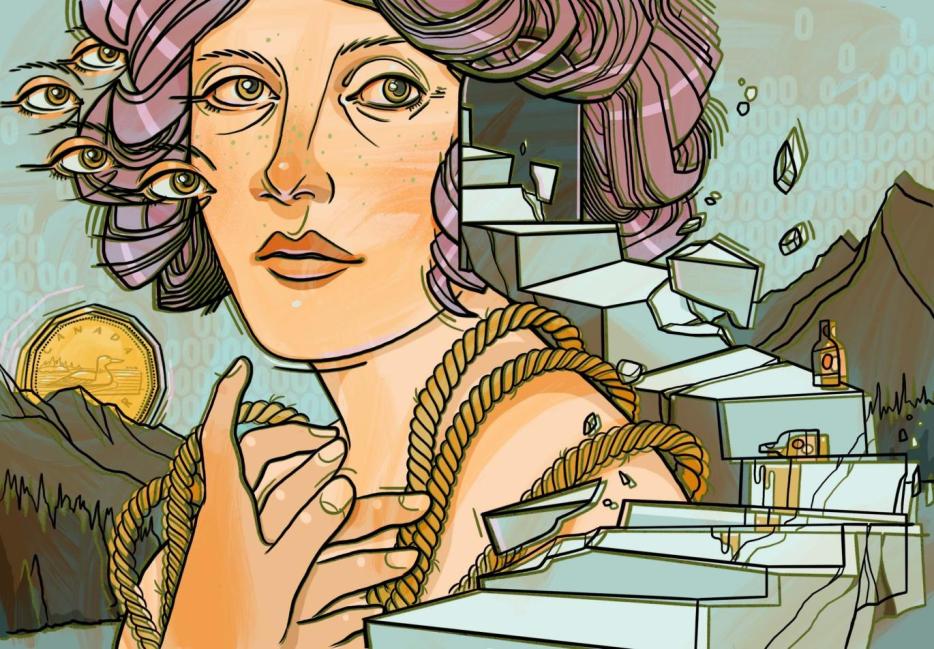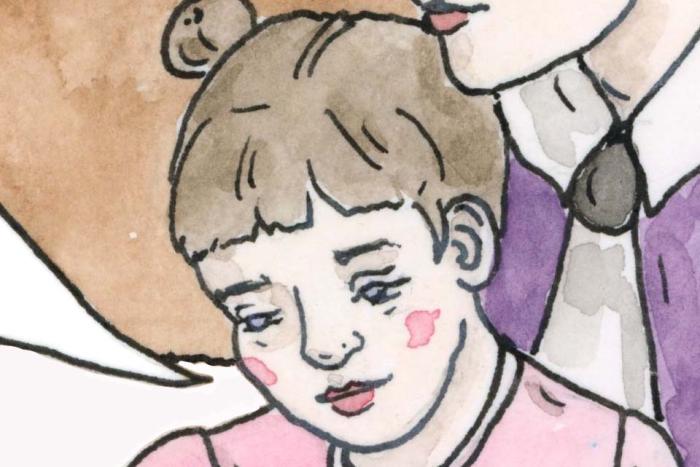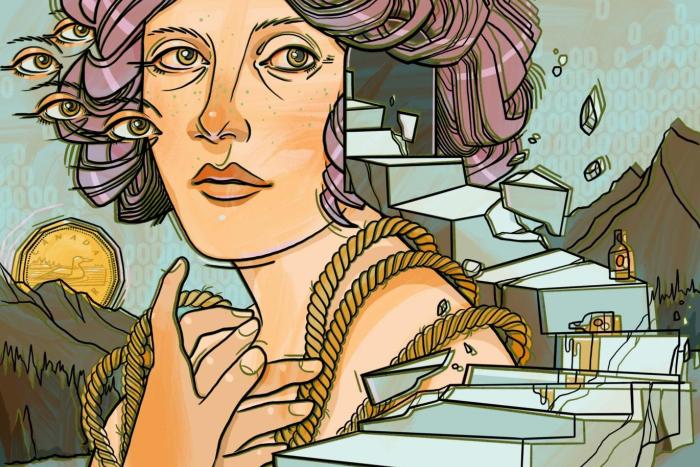What were we obsessed with, invested in and plagued by in 2023? Hazlitt’s writers reflect on the issues, big and small.
In the summer of 2021, the first time I thought that my sister would die, the immediate thought that sustained me was that my partner was eight months pregnant and that whatever else I felt I had to remain a functioning human for my kid. The other thought was that I wanted a drink.
My sister, Tamar—I called her Marush—was diagnosed with ovarian cancer in March 2020, just days before the US began shutting down. She was in New York. I was in London. I drank on my nightly walk around the block. I drank on Zooms with Marush—sometimes while she was in chemo alone but mostly in our respective living rooms. In May 2020, just before she was scheduled for her first major surgery, my partner and I flew to New York.
We were two of five people on a Boeing 777. The flight attendants left overflowing ziplock bags of snacks on our seats and then never approached us again. New York was the media’s chosen epicenter of the pandemic at the time, and I took a perverse pride in flying into the shit. To be able to take action, to go and be present despite the historical crisis and the all-encompassing crush of her diagnosis, felt, honestly, great. But of course, we didn’t have much choice.
Marush was older by four years. We were immediately recognizable as siblings, in the sense that we were both Ashkenazi Jews who kind of looked like Anne Frank. Vibes-wise, though, we clashed. All through our lives, I was brash and loud and desperate for attention and she was almost maniacally thoughtful. She also hated most people, which meant if she deemed you worthy, you were worthy. Her support for me was unconditional, though she often found me ridiculous. She would cut off family scraps with a simple “Amosi,” meaning, “stop talking, stop being a fucking idiot, actually listen.” I think that maybe neither of us ultimately understood each other. How could she be so calm? How could I be so frantic? So the relationship was complicated and prickly and interesting and great. Of course, I pined for simplicity: a less dynamic love and fealty between a brother and a sister. I’m sure she did, too. But it just wasn’t what we had.
In Brooklyn, we didn’t enter Marush’s apartment. We didn’t trust the rapid tests that were then available to confirm we didn’t have COVID-19. We hung around in the front yard, which was less a yard and more a patch of grass next to trash cans. We stayed at a friend's place nearby. On the walk over, we’d stop at an Italian place with confusingly great to-go margaritas. Six feet away from her, we drank and we laughed about how, in her massive N95 mask, sunglasses, and beanie, she looked like she was attempting to hide the fact that she was actually an invisible person.
The morning of the surgery, I met Marush, my brother, and my parents on the sidewalk in front of the Upper East Side hospital to stand by as she walked in. I couldn’t give her a hug. No one could accompany her inside. I had biked there. Marush was worried about me getting home safe. Finally she nodded at us. Then she walked in alone to a surgery that lasted nearly nine hours and removed huge parts of her insides. It was just one of many horribly courageous things she endured with no self-pity, no anger, no remorse. Her stability was the key to it all. She never freaked out, so we tried not to, either.
After we left her at the hospital, we went back to the trash yard. The entire time she was in surgery, we were drinking, waiting in mute horror to hear if she’d survived. When they called to say it had gone well I cried with joy.
After the chemo and the surgery, they said she was in remission. Then the cancer came back. They said there would have to be more chemo, but first another surgery. I was in London for this one. Late my time, maybe midnight, my brother called me to say the doctors had called him. This surgery had not gone well. That was the first time that I thought she would die.
*
At the very end, when I had to accept that she would die, we were in Boston. After the second failed surgery, she had been treated successfully at Mass General Hospital for nearly a year. An incredibly industrious doctor kept finding clinical trials, and they kept, miraculously, working. Then, not so miraculously, they stopped working. In January 2023, she got worse and kept getting worse. When we couldn’t bear it, when we needed some relief, my brother and I would leave the hospital and sprint into one of the three bars nearby. We always ordered the same thing: a bottle of Budweiser and a Jameson on the rocks. It was a comforting and familiar pairing and got us drunk fast. For twenty or thirty minutes, we would sit together and drink and cry and laugh. We’d inhale a few rounds and then we’d hustle back upstairs to our sister’s hospital room.
I’ve always felt like I’ve had a good relationship with alcohol. I drink almost every day. I enjoy the simple ritual of pouring a beer or making a martini. I like how it gets you…drunk. And while several people that know me surely think I should drink less, no one seems to think I should stop altogether. I view drinking exactly the same way as country musicians on the radio do. Eric Church’s “Drink in My Hand,” Billy Currington’s “Pretty Good at Drinkin’ Beer,” Miranda Lambert’s “Smokin’ and Drinkin’”—to all these songs I say “yes.” Internally, at least, I’m a calm drunk. During my sister’s illness, knowing that I could drink until I achieved numbness and, if I really needed it, oblivion—that was a balm.
My sister liked to drink, too, but in a different way. She worked in expensive restaurants for a long time and knew wine enough to actually appreciate it. She wanted to sit and enjoy herself with peace and good food. My mom is a great cook, and when we were all back home in the suburbs of Boston for a birthday or a holiday, she’d whip up a perfect roast chicken or a beef stew while my sister assisted and I sat at the kitchen table and drank wine and chattered at them both.
During the meals I’d argue with my dad about unions or whatever, until Marush would eventually remind us, in her politely stern way, that neither of our surely correct opinions on the matter were about to be actualized into policy. For dinners out, she and I were the two people most committed to the collective choice of a restaurant. I would pitch Uzbekistani. She’d want refined New American. Everyone always agreed with her. I know some families do hiking trips or garden or go for runs. As a family, all we ever, ever did was sit and eat and drink and talk.
She moved to New York first, in the mid-2000s, and I remember pulling up to her apartment in the East Village for the first time and having my mind blown. It felt so cinematic. How could this be real? I moved a few years later. I think we both felt that the purest reason to live in New York despite all the horrible stuff was the eating and the drinking.
The last time we sat and drank together, it was at one of those three bars closest to the hospital in Boston. It had been increasingly difficult for her to get outside, but that afternoon my sister said she wanted fresh air, and then she said she wanted to go to the bar. She was in a wheelchair with all of this horrible medical equipment strapped to it. We drank beers. My sister had a few sips of one. I know that we laughed then because I have photos and can see us laughing. I remember feeling like we were enjoying the moment for what it was and nothing more. But when I think back to it now, I don’t feel much positivity. That’s not the place she wanted to be. If she could have, she would have made us go to a cooler place with better food.
*
My kid is two now, and my partner and I are expecting our second child. I’m trying not to drink around her out of solidarity. I told my brother my personal rule is that if we’re out around other people that are drinking, then I drink, but if we’re home alone, just us, then I don’t. He said it sounded like I was saying I would only get as drunk as the drunkest person in the room and I said that sounded right.
The net result is that I look forward to times when I can drink, when I hope a drink will give me a break from the grief. I went out recently with some dudes to Keens, the great old steakhouse in Midtown Manhattan. I was excited for the mutton but I was more excited to drink too much. I did drink too much. I had a martini, then two beers, then another martini, then a port — my first-ever port. I remember it being described as a tawny port. Then we went to karaoke and I had more beers and also soju. I made it home and passed out on the couch. My partner woke up in the middle of the night and didn’t know where I was because I had passed out on the couch.
The next day I felt possibly as bad as I had since my sister died. Any balm that the night’s drinking had provided was gone. All that was left were raw nerve endings. I was very hung over. I cried on and off all day.
*
The fact that the drinking isn’t helping is, counterintuitively, helpful. I know that I can’t drink my way through my crying jags and I know that’s because I miss my sister way too much for a beer to help. It can never be enough to push back against the horror.
I keep seeing a person around Brooklyn that I believe is the independent film actor Josh Hamilton and I want to text her about it. She was truly the only person in my life who would have actually cared. I want to tell her I’m doing sibling bereavement group therapy because I know she would be happy to hear that. I want to win her approval.
When I drink with my brother now, we usually do our beer and whiskeys again. With him there, with us talking about her, with the Budweiser and the Jameson, it can feel like a concrete boost. But what I’m missing is the next step: the part where we go back up the elevator to her hospital room and she’s still there. I can’t bring myself to pine for another dinner, another squabble. But I am still pining for another beer and whiskey and another trip up the elevator to the hospital room to see her one more time.
When she first got diagnosed, she gave me a bunch of anti-anxiety pills. I’d try to only take them when I really needed them, when I was really panicking. She replenished them over the years but I’m down to just a few. I have them in one of those little round plastic prescription pill containers with her name on it. I keep it with me in my backpack now. As far as altering my mood via ingesting something goes, I know the pills will work. But I’d rather not use the last few. I’d rather keep that pill container with me for a little while.






